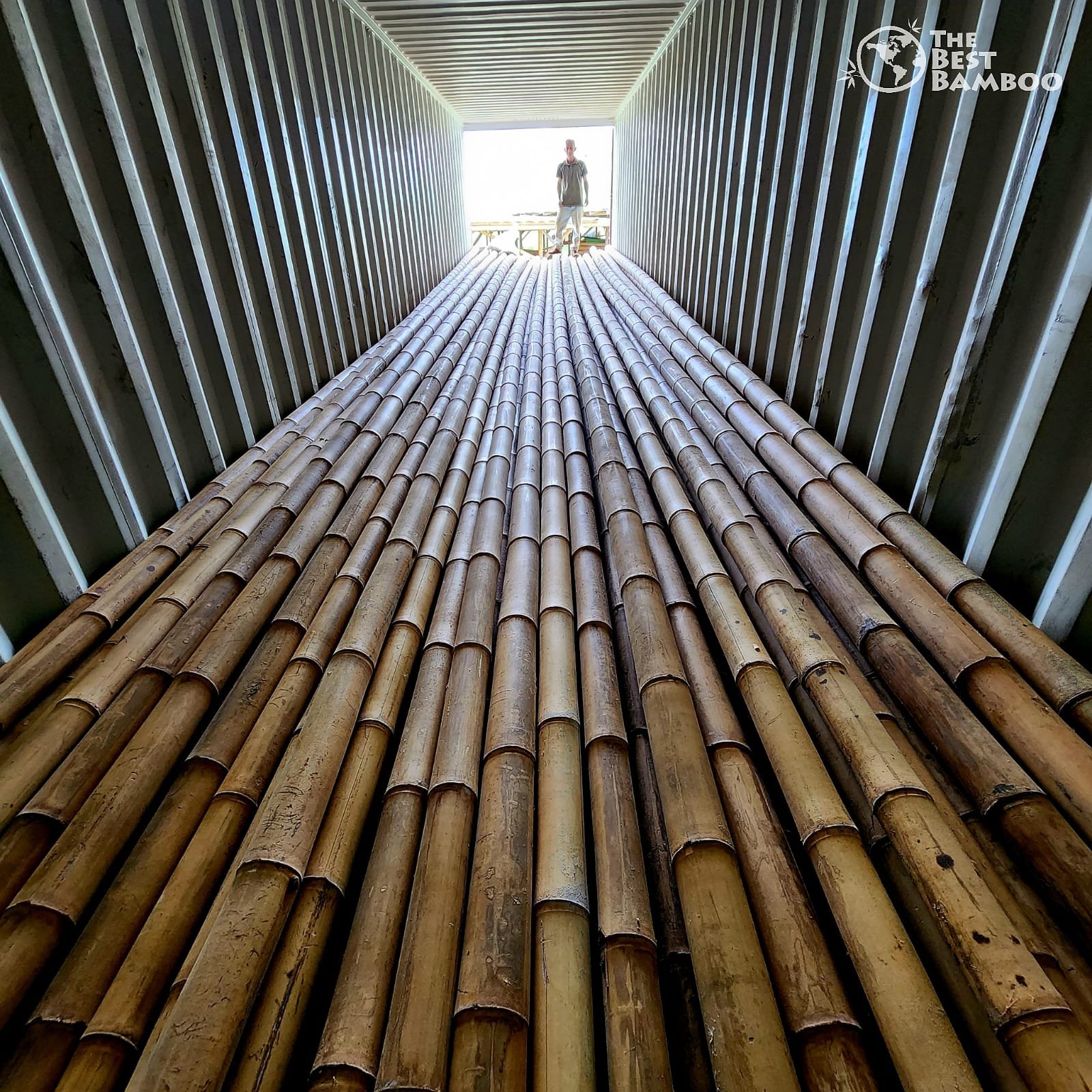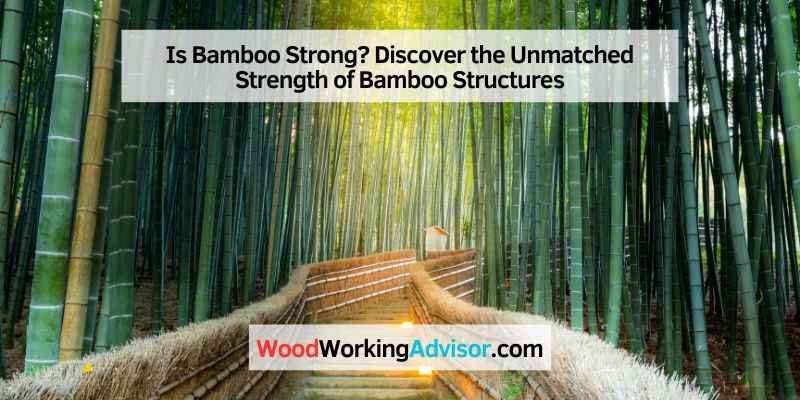Yes, bamboo is a strong material that exhibits impressive durability and strength. It is known for its high tensile strength, making it suitable for a wide range of applications.
Bamboo has been used as a construction material for centuries, particularly in Asian countries where it is abundant. Its strength-to-weight ratio surpasses that of steel, giving it a competitive edge as a sustainable alternative. Bamboo’s natural fibers provide flexibility and resistance to various environmental elements, such as wind, water, and pests.
Furthermore, its rapid growth rate and ability to regenerate make it an environmentally friendly choice compared to traditional building materials. With the increasing focus on sustainable solutions, bamboo has gained traction as an attractive option in industries such as architecture, furniture, and even sporting goods. We will explore the strength of bamboo in detail, discussing its benefits, applications, and contributions to sustainable development.
The Strength Of Bamboo
Bamboo is renowned for its incredible strength and durability, making it one of the most versatile and sought-after materials in various industries. In this section, we will explore the natural characteristics and the exceptional tensile strength of bamboo.
Natural Characteristics
- Bamboo is a type of grass that grows abundantly in various climates and regions around the world.
- It is known for its rapid growth, with some species capable of reaching heights of up to 100 feet in a matter of months.
- The remarkable hardness and density of bamboo stem from its unique cellular structure, which consists of a series of elongated fibers.
- These fibers are reinforced with a high content of silica, providing bamboo with natural resistance against pests, rot, and moisture.
- Due to its resilience and longevity, bamboo has been used for centuries in construction, furniture making, and even as a replacement for steel in reinforced concrete.
Tensile Strength
Bamboo possesses exceptional tensile strength, which refers to its ability to resist forces that try to pull it apart. This makes it an ideal material for applications that require flexibility and resistance to bending or breaking.
The tensile strength of bamboo can vary depending on several factors, including the species of bamboo, its maturity, and the conditions in which it grows. However, on average, bamboo has a tensile strength superior to that of many other building materials.
For example:
| Material | Tensile Strength (MPa) |
|---|---|
| Bamboo | 350-550 |
| Steel | 250-550 |
| Timber | 40-80 |
Bamboo’s impressive tensile strength, paired with its lightweight nature, makes it an excellent choice for applications such as scaffolding, bridge construction, and even as a reinforcement material in earthquake-prone areas.
It is worth noting that bamboo’s strength also contributes to its sustainability. With its quick growth cycle and regenerative properties, bamboo is an environmentally friendly alternative to traditional materials, reducing the strain on finite resources.

Credit: thebestbamboo.com
Bamboo In Construction
Bamboo, a fast-growing renewable resource, is not only used in the production of furniture and crafts, but it is also gaining popularity in the construction industry. With its impressive strength and versatility, bamboo is proving to be a viable alternative to traditional construction materials.
Structural Applications
Bamboo’s sturdiness and flexibility make it ideal for a variety of structural applications in construction. Its natural properties allow for the creation of lightweight yet robust structures. From scaffolding and formwork to roofing and flooring, bamboo is proving to be a reliable choice.
Advantages Of Traditional Materials
When compared to traditional construction materials like steel and concrete, bamboo offers several advantages. Here are some key benefits:
- Eco-friendly: Bamboo is a highly sustainable resource as it can regenerate within a few years, making it an excellent choice for environmentally-conscious builders.
- Strength: Despite its lightweight nature, bamboo exhibits exceptional tensile strength, making it sturdy enough to withstand heavy loads and extreme weather conditions.
- Flexibility: Bamboo’s natural flexibility allows it to absorb shocks and vibrations effectively, making it resistant to earthquakes and other natural disasters.
- Cost-effective: Bamboo is relatively inexpensive compared to traditional materials, making it an affordable option for construction projects with tight budgets.
- Energy efficiency: Due to its natural insulating properties, bamboo helps regulate temperature and enhance energy efficiency in buildings.
Furthermore, bamboo has a significantly lower carbon footprint compared to steel and concrete production processes. Its rapid growth and ability to absorb higher levels of carbon dioxide make it a sustainable material choice for reducing environmental impact in the construction industry.
All these advantages combined make bamboo a compelling option for sustainable and efficient construction practices. As more builders and architects recognize its potential, the use of bamboo in construction projects is expected to witness a significant rise in the coming years.
Challenges And Misconceptions
Environmental Impact
Bamboo is often misunderstood as a potentially harmful resource due to misconceptions about its environmental impact. It’s crucial to dispel the notion that bamboo harvesting contributes to deforestation. In reality, bamboo is one of the fastest-growing plants on Earth and can be sustainably harvested without harming the environment. Additionally, the natural regenerative properties of bamboo make it an eco-friendly alternative to traditional timber. Its ability to thrive without the use of pesticides or fertilizers further enhances its environmental appeal.
Durability And Longevity
Another common misconception is that bamboo is not as durable and long-lasting as traditional hardwoods. This notion couldn’t be further from the truth. When properly treated, bamboo can exhibit remarkable strength and durability, often surpassing many hardwoods in these aspects. Its natural resilience against moisture and pests, when combined with modern manufacturing techniques, results in long-lasting products that can withstand the test of time.

Credit: www.amazon.com
Innovations And Future Potential
When it comes to strength and durability, bamboo is making a significant impact in various industries. Through modern engineering techniques, this versatile material showcases its potential for innovation in sustainable architecture.
Modern Engineering Techniques
Bamboo, traditionally seen as a symbol of sustainability and natural beauty, has now become a focal point for innovation in engineering. With advancements in design, researchers and architects have found ways to harness its incredible strength.
1. Reinforcements: By incorporating various reinforcement techniques, such as laminating or gluing bamboo strips together, engineers have been able to create stronger and more resilient structures. These techniques enhance the tensile strength of bamboo, making it comparable to other construction materials like steel and concrete, while still maintaining its eco-friendly characteristics.
2. Composite Materials: Another approach to enhancing the strength of bamboo is through composite materials. By combining bamboo fibers with other elements like resins or fibers from different plants, researchers have been able to create composites that exhibit exceptional strength and flexibility. These composite materials have the potential to revolutionize various industries, from construction to automotive manufacturing.
Potential In Sustainable Architecture
Bamboo’s strength and versatility make it an ideal candidate for sustainable architecture. Its impressive load-bearing capacity, combined with its fast growth rate and renewability, has drawn the attention of architects and designers worldwide. Here are a few ways bamboo is being explored for sustainable architecture:
1. Structural Elements: Bamboo can serve as a primary structural material, providing the necessary support for buildings. Its strength-to-weight ratio makes it an exceptional choice for beams, columns, and trusses. Additionally, bamboo’s unique cellular structure makes it resistant to earthquakes and high winds, making it an attractive option for regions prone to natural disasters.
2. Sustainable Facades: Bamboo can also be used as a sustainable cladding material, adding an aesthetic appeal to buildings while reducing the carbon footprint. Its natural textures and colors create visually appealing facades that require minimal maintenance.
3. Eco-Friendly Interiors: Bamboo is not limited to external applications; it can also be utilized in interior design. From flooring to furniture, bamboo offers a sustainable alternative to traditional materials. Its durability and aesthetic appeal make it an excellent choice for creating stylish and environmentally friendly living spaces.
As the world continues to acknowledge the importance of sustainable practices, bamboo’s potential in innovative engineering techniques and sustainable architecture becomes even more significant. Its versatility, strength, and environmental benefits position it as a material of the future.
Frequently Asked Questions On Is Bamboo Strong
Is Bamboo Stronger Than Wood?
Yes, bamboo is stronger than wood. It has a higher tensile strength and is more resistant to bending and breaking. Additionally, bamboo grows faster, making it a sustainable and eco-friendly choice for various applications like construction and furniture.
Is Bamboo Stronger Than Steel?
Bamboo is not stronger than steel but it has a high strength-to-weight ratio making it a strong and flexible material used in construction and manufacturing. It is also eco-friendly and sustainable.
How Much Weight Can Bamboo Hold?
Bamboo is a strong and versatile material that can hold various weights depending on its size and quality. However, on average, bamboo can hold about 4,000 pounds of weight per square inch.
How Long Does Bamboo Stay Strong?
Bamboo remains durable and strong for a considerable period. Its lifespan depends on factors like species, climate, and maintenance. With proper care, bamboo can stay strong for many years. Its impressive strength makes it a popular choice for various applications like construction, furniture, and flooring.
Conclusion
To sum up, bamboo’s exceptional strength makes it an ideal material for various applications. With its eco-friendly and sustainable properties, it’s no wonder bamboo has gained popularity. Whether used in construction, furniture, or textiles, this versatile plant stands out as a durable and resilient choice.
Embracing bamboo can lead to a more sustainable future.


